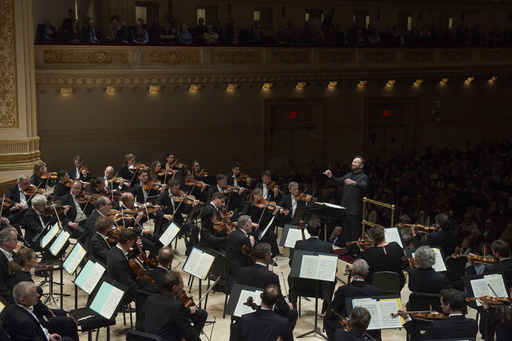NEW YORK — Kirill Petrenko has taken on the formidable task of directing the Berlin Philharmonic, often regarded as one of the finest orchestras in the world. The conductor recognizes the complexity that comes with leading a group of over a hundred musicians. “A hundred musicians have 100 opinions and 100 expectations — 100 different expectations,” he noted, emphasizing the challenges of creating a cohesive artistic vision.
Stefan Dohr, the orchestra’s principal horn player, echoed this sentiment, remarking that unifying such a diverse group is no small feat. “I think everybody has more than one opinion,” he added, highlighting the intricacies of group dynamics in orchestral performances.
As Petrenko embarks on his sixth season as the chief conductor, he leads the Berlin Philharmonic on its 25th tour of the United States, with performances scheduled from November 15 to 26. The orchestra will give eight concerts in cities including Washington, D.C.; New York; Boston; Ann Arbor, Michigan; and Chicago. The repertoire for these performances features Rachmaninoff’s “The Isle of the Dead,” Korngold’s Violin Concerto, and Dvorák’s Seventh Symphony in one program, while another program focuses solely on Bruckner’s monumental Fifth Symphony, marking the 200th birthday of the composer celebrated in September.
During a recent Zoom press conference with media from the U.S., Petrenko, now 52, reflected on his artistic journey. He shared that in his earlier years, he was more closely connected with Mahler due in part to his Jewish background and feelings of being an outsider. “But maybe it will change, and now I worked very intensively with this Bruckner,” he noted.
Recent concerts at Carnegie Hall showcased Petrenko’s ability to evoke deep emotional nuances, utilizing expressive gestures to punctuate musical phrases. His distinctive conducting style, filled with dynamic arm movements and sharp cues, brings a unique presence to the performance hall.
Petrenko joins a prestigious line of illustrious conductors who have led the Berlin Philharmonic, including the likes of Hans von Bülow, Herbert von Karajan, and Simon Rattle. Despite the rise of digital concerts and streaming, the experience of live performances remains irreplaceable. According to Andrea Zietzschmann, the orchestra’s general manager, the importance of touring is paramount for connecting with audiences: “We want to first meet our audiences,” she stated, emphasizing the orchestra’s role as cultural ambassadors.
The Berlin Philharmonic boasts diversity among its members, representing 34 different nations, including five Americans. One of the concertmasters, Noah Bendix-Balgley, contributes to this mix.
Born in Omsk, Siberia in 1972, Petrenko moved to Austria during his teenage years and eventually transitioned to Berlin. He previously held significant positions as the general music director in several renowned institutions, including Munich’s Bavarian State Opera. His experience has enhanced his confidence on the podium, allowing him to conduct rehearsals with a more instinctive understanding of his musicians. “I can trust, and I cannot mention things too much in the rehearsal,” he said, highlighting the benefits of familiarity with his orchestra.
Petrenko’s views on Bruckner have transformed throughout his career. He described how his initial reluctance to engage with the composer’s work changed after immersing himself in Austrian culture, saying, “I started to understand a little bit.” Recently, the Berlin Philharmonic opened its season with Bruckner’s Fifth Symphony before touring the U.S., where they performed the piece both in Berlin and at significant venues across Europe.
In preparation for performances, Petrenko invests time listening to historical recordings, such as those conducted by Wilhelm Furtwängler. He believes revisiting these recordings helps bridge the gap left by lost traditions. “We can be brilliant. We can be perfect. We can be fantastic performers, but the authentic side of one piece is very, very difficult to achieve,” he explained. For Mahler’s Ninth Symphony, he seeks inspiration from Bruno Walter’s renditions, and for Strauss’ “Der Rosenkavalier,” he references the interpretations of Erich Kleiber and Clemens Krauss.
Petrenko acknowledges the challenge of recreating the past. “Absolutely unachievable. You can’t do it today like this,” he emphasized, advocating for a gradual restoration of tradition. The orchestra, in turn, has grown attuned to Petrenko’s artistic vision and approach. “We are now approaching the moment where we do understand what Kirill Petrenko wants without him explaining it most of the time,” Dohr remarked, highlighting the deepening connection between conductor and orchestra.
